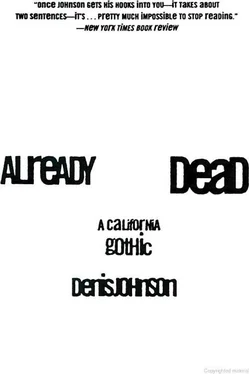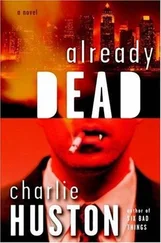peared, as if its shadows were sketched on the rug. Give the woman her breath, give it back, keep it. He moved his hands to her jawline and it divided slackly at his touch. He kissed her open mouth. Yours now, keep it, give it back, something said.
Lying out in the garden patch watching the stars, Meadows swam in the wasted confusion and panic he’d felt during childhood illnesses — the true understanding of the scene: no doctor, no medicine, nobody’s mom or dad can help you.
He tried to tune in to its physical sensations, tried to stay still inside and wait for things in there to come right. It got down as usual to discipline: be with this. It was an art. Like surfing, it wedded the mind to the muscles.
He concentrated his mind on the heavens. There was Orion’s tristar belt, and the stiff dangling sword. This far from any artificial light source the Milky Way’s rim stood prominent, snaking among the suns. One day he’d see one of those things go nova. He just had to live long enough and watch. Many of the ancients had believed that a nova, no matter how far-off, signaled God the Dragon’s most intimate incinerating touch on the feathers of history. The magic man called Takinsata, or Doctor Snake, had witnessed such a thing in the sky two thousand years ago from this coast — the same herald-star of Christ in the unimaginable East — and been fixed with such power that afterward he melted rocks with his breath and with his claws raked scars in the surfaces of the lakes. He strode the coastal forests tearing and scattering the red hairs from his head and they grew into the redwoods. Where he sprinkled his urine rhododendrons grew up. His eyes were so strong and so beautiful that fish from the sea swam up into the fresh streams to find them, and the steelhead and salmon and cutthroat still do so to this day, and there they find his eyes, which look to us like their births, spawning, and deaths. Doctor Snake gave the coast people their language, their skills, their legends. Eventually a god of the White Darkness, one of the Athabascan progenitors from five mountain ranges north, came and gave him a red mushroom with shiny speckles and he ate it and flew away.
But Doctor Snake had witnessed the very moment of a nova’s birth.
Thus his power.
Meadows watched the constellations wheel above. A probing visitant illumination edged his sight: silent heat lightning stuttering up 356 / Denis Johnson
from too deep a place to be audible, the hills around flickering and failing as if trying to kindle themselves out of the empty dark. He wept.
He fell asleep.
Later something shocked him awake. A gigantic voice. An agony at the foundries of the real. The slap of it drove down his flesh, but then it was only thunder, small and lowing, rolling down and gone away.
He sat up; the hair tickled all over him. A wind had been working, and he tasted dirt. Bright veins scintillated to the east, real lightning, though he didn’t smell a bit of rain. He watched the dry storm. It struck just across the canyon once, twice, an election designated by crippled-looking talons — the flash, the black catch between, and then thunder to tear your skull away, first an incomprehensible fact, then a sound, then a voice, rushed and elderly, fading at the brink of intelligibility.
The lightning started a fire in the hills. For hours it seemed covert and unlikely, signaling at great intervals as a struck log, he guessed, was fanned intermittently. But eventual gusts drove it into the brush, and then it woke up and raced around with the breezes until on the tindery hillside a riot of flames was under way.
He crouched beside his sleeping bag over the lantern and got it lit, pulled on his boots, broke down his A-frame and weighted the tarp, flattened on the ground, at its corners — with his bag, his rifle, a rock, a chunk of firewood — but he set the lamp aside and worked beyond the perimeter of its light, because he needed both hands. He walked the garden, tore out each plant and beat it viciously against the earth, clearing the rootwork of clots, and lay each across the plastic. The tarp, ten by twenty feet, barely accommodated this premature harvest. He rolled the tarp up from one end as tightly as he could, appreciating sadly that he was producing, in fact, one gigantic mother of a joint. Ten feet long and two yards in diameter and weighing above a hundred pounds, laced around with yellow nylon rope. He cached it behind the spring box and sprinkled its blue bulk with bits of manzanita and rhododendron. By now it was well past dawn, by now the atmosphere to the east was full of brown smoke and carried a noise like a distant locomotive. Two spotter planes, small Cessnas, plied the sky like fish in a tank.
Shortly after ten o’clock in the morning, Meadows stood finishing a can of Colt.45 in the grave site behind the Gualala Lutheran Church. The chapel and its residence were fifties-era buildings, both of them, though out back on a bluff which, but for evergreens, would have looked down a short drop onto the Gualala Safeway, lay this little inexplicable fenced plot of graves from the turn of the century. One of the saddest and most satisfying places he’d ever stood in.
That it probably belonged to the Lutheran churchyard was news to him. He’d come on it from below, climbing up here one day to watch — was it fireworks? — something out over the sea. He couldn’t remember. Now he’d stumbled onto them again, these seven wooden markers, not crosses, but listing and reeling blades of cedar too weathered to be legible.
Today his awareness fixed itself toward the upward slope, toward the two Lutheran buildings. The daughter would be at school. But Mrs.
Connor ran a bookshop that didn’t open till eleven or so. He waited among the graves until he heard her car fire up and get away, and then walked around the church’s left side, the side farthest from the residence.
None of the churches had any size to them in these parts. This one was no larger than the one he’d blundered into and out of in West Point.
He tried the front doors. Locked tight. He went to the building’s corner and saw no cars in the open garage.
The door to the residence opened, and the reverend called, “I’m over here! Hi!”
Clarence lifted his hand in a tentative greeting as he hiked the long porch.
“Good morning!”
“I’m Clarence Meadows.”
“Of course, of course — Clarence. Come in.” Reverend Connor, though at home, looked dressed for business in a western shirt and string necktie and dark slacks, his paunch divided by a wide rawhide belt and buckled fiercely with a Stetson buckle. Meadows knew him to have come from Buffalo, or maybe Albany. “I’m afraid we’ve got fire in the county,” he said.
“I’d say so.”
“It’s a shame.” For a few seconds he studied Clarence’s face. “Is that LP land over there? It’s due east, isn’t it?”
“Georgia Pacific.”
The minister shut the door behind them and led the way to the living room. “What a waste. And it’s mostly blowing east?”
“I haven’t heard.”
“I heard it was. I guess we’re spared, but what a terrible, terrible shame. But it was lightning. What can you say to that? Sit. Sit. Would you like some tea?”
Clarence sat on the couch and said. “You know me. Of me.” The Reverend Connor seated himself in a leather easy chair and continued looking Meadows over, openly puzzled. “Well, of course I know you, did you expect me to forget? You helped Cassandra when she hit that poor sheep.” The minister had a teenage daughter, unlucky behind the wheel more often than just the once, and a beautiful dark-haired wife who seemed entirely nice but to whom Meadows, on nothing but a hunch, attributed the Reverend’s secret apostasy.
Читать дальше












